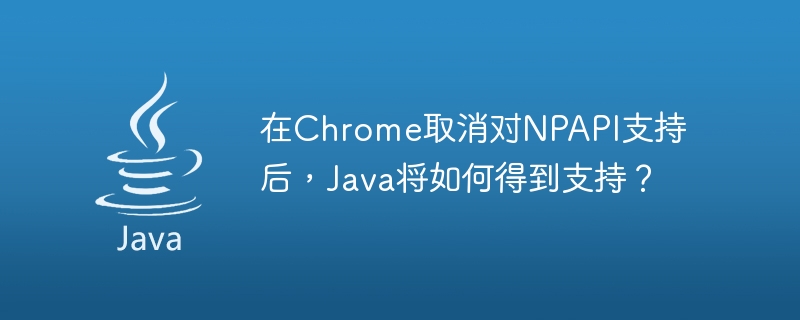Home >Java >javaTutorial >How will Java be supported after Chrome removes support for NPAPI?
How will Java be supported after Chrome removes support for NPAPI?
- WBOYWBOYWBOYWBOYWBOYWBOYWBOYWBOYWBOYWBOYWBOYWBOYWBforward
- 2023-08-19 18:21:211091browse

Java is a widely utilized & advanced programming language. It has been depended upon for additional web applications. However, because of safety considerations, Chrome has sloped support for the Netscape Plugin API (NPAPI ), which has been used to sustain Java applets on web pages. This move by Chrome has raised worries among developers & users about the end of Java in Chrome.
In this article, we will explore how Java will be supported in Chrome after NPAPI support is discontinued.
How does NPAPI help Java run on Chrome?
NPAPI (Netscape Plug-in API) is an application programming interface. It allows web browsers such as Google Chrome to execute plug-ins, including Java. Here are a few ways NPAPI helps Java work on Chrome:
Simplifying the creation of Java plug-ins − NPAPI provides a standard way for developers to create plug-ins that can run in web browsers. Java developers can use NPAPI to create Java plug-ins that can be used in Chrome.
Provides a bridge between Java and Chrome − NPAPI serves as a bridge between Java & Chrome. It allows Java to communicate with Chrome & vice versa, letting Java work seamlessly in the Chrome browser.
Support Java applets − Java applets are mini Java applications that can run within a web browser. NPAPI provides the critical infrastructure for Java applets to execute in Chrome.
Assures compatibility − NPAPI guarantees that Java plugins are compatible with Chrome. By delivering a standard interface, NPAPI allows Java plugins to work seamlessly in Chrome, however of the version or operating system.
Overall, NPAPI plays a vital role in allowing Java to work in Chrome, enabling users to access Java-based web applications and services in the browser.
Java Web Start
Java Web Start is an alternative interpretation of NPAPI used to help run Java applications on web pages. It allows users to launch applications from a web page. When launched, the application does not require the use of browser plug-ins. Instead, it downloads and runs the application on the user's device. With this solution, Chrome users can start using Java applications on the web again without relying on NPAPI.
Deployment Toolkit
Another key to keeping Java in Chrome is that you can use deployment toolkits. The toolkit is a JavaScript-based solution that allows detection and deployment of Java applications. It can discover whether Java is present on the user's machine. It allows downloading and installing the required Java version. This solution helps you get the job done without requiring NPAPI. It allows users to run Java applications without browser plug-ins.
Chrome Native Messaging
Chrome native messaging is a new solution that can be used to support Java in Chrome. It allows Chrome to communicate with local applications installed on the user's machine. This solution can be used to launch and communicate with Java applications from inside the Chrome browser. Using Chrome native messaging, Java can be supported without using NPAPI or any other browser plugin.
Enterprise Solutions
For business and organizational users who rely on Java applications, there are several solutions available. They can use any of these solutions. One of the widely used or popular answers is to use virtualization technology. There are many known virtualization technologies, such as VMware ThinApp or Citrix XenApp. These methods enable Java applications to be virtualized and deployed on the user's machine. It allows Java applications to work without requiring NPAPI or other browser plug-ins.
Java on Other Browsers
Only Chrome has dropped the support for NPAPI, but all other browsers are open to it. Browsers such as Firefox & Safari still keep it. It indicates you can use Java on these browsers. You can easily use them without the need for any other solution. However, it is worth noting that NPAPI support is also being phased out on these browsers. Developers should evaluate alternative keys for sustaining Java in the long term.
in conclusion
In conclusion, the fall of NPAPI support by Chrome does not mean the end of Java in Chrome. There are a few other alternative solutions available. You can use them to support Java applications on the web. From the above, we know that Java Web Start, Deployment Toolkit, Chrome Native Messaging & virtualization technologies are some of the solutions. You can use them any time to support Java in Chrome. While alternative solutions may be required, Java can still be used on other browsers that support NPAPI . As technology persists to evolve, developers should remain vigilant & consider alternative solutions for helping Java in the long term.
The above is the detailed content of How will Java be supported after Chrome removes support for NPAPI?. For more information, please follow other related articles on the PHP Chinese website!
Related articles
See more- Why and How Should You Synchronize on String Objects in Java?
- Why is SimpleDateFormat Assigning All Dates to January When Parsing Active Directory Dates?
- Why Is Java SimpleDateFormat Consistently Returning January for Month?
- How Can AtomicInteger Enhance Concurrent Programming in Java?
- How to Convert Java Timestamps to Different Time Zones?

